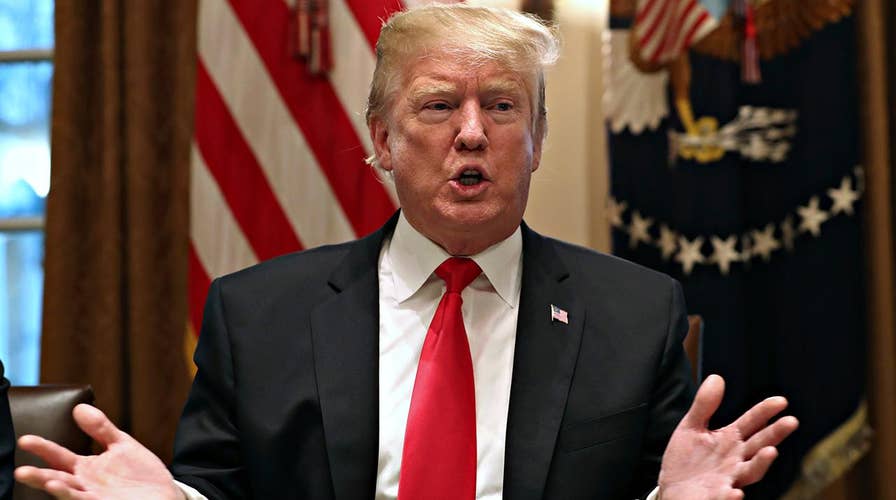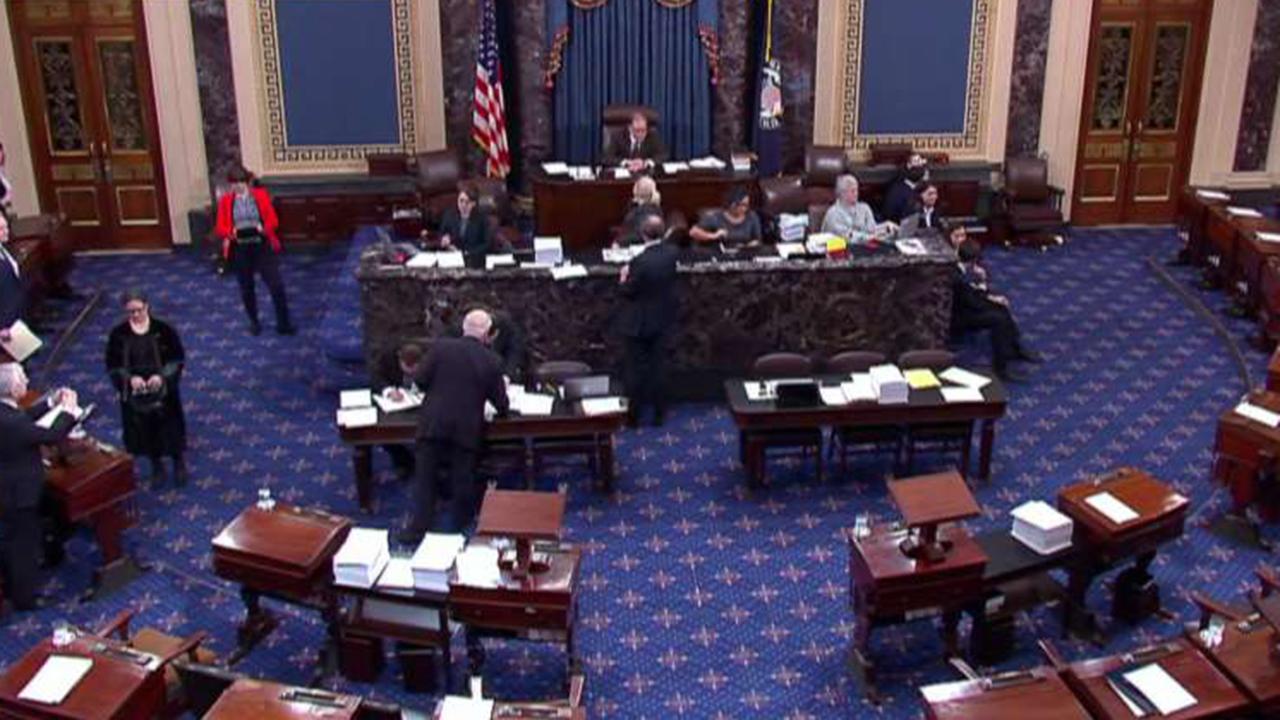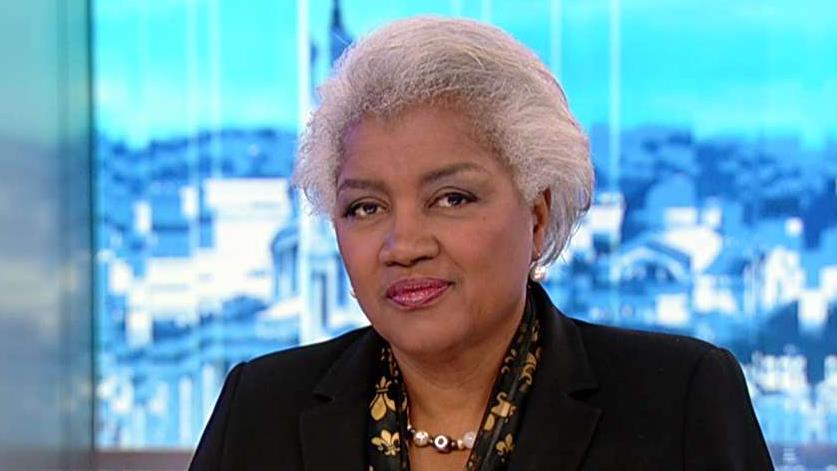Trump comments on next steps after failure of Senate bills to end government shutdown
President Trump reiterates need for border wall, says Senate Leader Mitch McConnell is negotiating with Senate Minority Leader Chuck Schumer.
The White House on Thursday signaled that a "large down payment" on border wall funding -- and potentially less than the $5.7 billion that President Trump has long requested -- could be sufficient to bring Republicans to the table and end the ongoing partial federal government shutdown.
The possible concession from the White House came just minutes after the Senate rejected both Democratic and GOP proposals to end the shutdown, with both measures falling far short of the 60-vote threshold needed to pass.
But Democratic House Speaker Nancy Pelosi dismissed the proposal shortly afterward as a nonstarter, saying it was "not a reasonable agreement."
"I don't know if he knows what he's talking about," Pelosi added, referring to Trump.
The White House, in response, slammed Pelosi's consistent rejections of compromise proposals. The House speaker has previously said she would not support any legislation that includes funding for the wall, which she characterized as an "immorality."
TOP DEMS BREAK WITH PELOSI, ACKNOWLEDGE WALLS CAN WORK
"I know some people call her 'Fancy Nancy' -- these days, I think a better nickname is 'Dr. No,'" White House adviser Kellyanne Conway told Fox News on Thursday, referring to Pelosi. "Just keep hearing 'no' -- just 'no no no' all the time - you can't just stomp your feet and say, 'Harrumph.'"
The Republican package that failed in the Senate would have provided the $5.7 billion while also offering several immigration-related concessions and tightening asylum rules, while the Democratic bill had no wall funding and included disaster-relief funding.
"Leader Mitch McConnell and Sen. Chuck Schumer are meeting now to see whether or not they can work out of the deadlock," White House Press Secretary Sarah Sanders said Thursday evening, after the Senate votes. "As was made clear to Sen. Lindsey Graham, the three-week CR [continuing resolution] would only work if there is a large down payment on the wall."
Trump, in separate comments to reporters at the White House, suggested that a "prorated down payment" on the wall, also without providing a concrete dollar figure, could be viable.
"If they come to a reasonable agreement, I would support that," Trump told reporters, referring to Schumer and McConnell.
"We have a lot of alternatives" to end the shutdown, Trump added, before he asserted that illegal immigration and drug trafficking constituted a "virtual invasion" of the U.S. that could be stopped only by "a strong barrier or wall."
If some of the "ingenious" smugglers and traffickers "were ever legit, they'd become very rich people," Trump said.
He added: "Border Patrol -- all of the drones flying up in the air, having a lot of fun flying drones all over the place -- they don't mean a thing when they look down and they see thousands of people rushing our border. The only thing that works is a strong barrier or wall."
Separately, the president said it was "very reasonable" for Pelosi to block his planned State of the Union address in the House of Representatives until the end of the shutdown.
But in her own remarks Thursday, Pelosi said she was unsure what Trump was proposing, and indicated that a continuing resolution with any wall funding was a nonstarter.
“That is not a reasonable agreement between the senators," Pelosi said, referring to a possible down payment on the wall.
Meanwhile, Texas House Rep. Dan Crenshaw noted on "Fox & Friends" that Pelosi and Democratic leaders are actively blocking Republican efforts to ensure that federal workers are paid.
“This is a very little known fact but it’s very important," Crenshaw said. "Over the last week, we voted twice on a motion to recommit, which would send an appropriations bill back to committee, in order to pay federal workers. Now this is separate from the bipartisan plan to give them backpay. That’s separate. This is two other bills that would actually pay them in real time. This would actually pay them right now."
If Democrats' "priority is really federal workers," Crenshaw said, "then let’s actually pay them so that they can’t be used as pawns."
For his part, Graham, R-S.C., said in a statement Thursday, "The way forward is clear to me: a three-week continuing resolution (CR) that includes a down payment on wall/barrier funding and priorities of Democrats for disaster relief, showing good faith from both sides."
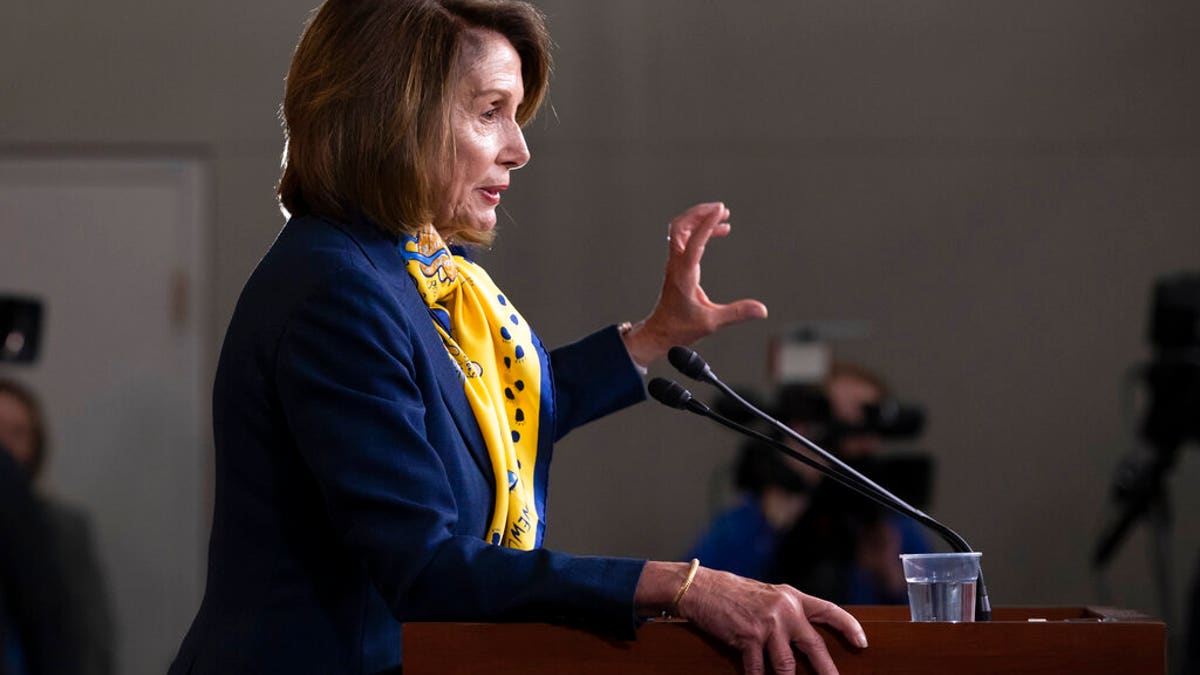
Speaker of the House Nancy Pelosi, D-Calif., talks to reporters a day after officially postponing President Donald Trump's State of the Union address until the government is fully reopened, at the Capitol on Thursday. (AP Photo/J. Scott Applewhite)
A continuing resolution is a form of appropriations legislation that extends funding for government agencies for a limited period based on previously allocated funding amounts.
The dueling Republican and Democratic proposals to end the shutdown that were defeated in the Senate earlier in the day had been expected to fail, but both sides said they hoped the votes would spur compromise on the 34th day of the shutdown -- and that seemed to be the case.
WHY TWO GOP SENATORS DEFECTED, VOTED NO ON GOP BILL TO END SHUTDOWN
But although Pelosi seemingly rejected Trump's proposed down payment, she might have another suggestion waiting in the wings. Earlier Thursday, former Democratic National Committee chairwoman Donna Brazile told Fox News that Pelosi would soon put forward "an alternative package" in a bid to end the ongoing partial government shutdown.
Brazile told Fox News' "The Daily Briefing with Dana Perino" that she did not know exactly when the measure would be announced, but said it would contain "a lot of border security items."
Republican senators appeared increasingly anxious to end the shutdown. The final vote on the GOP bill on Thursday was 50-47, with West Virginia Democrat Joe Manchin the lone Democrat to cross over and support the GOP package.
Trump on Thursday said he was "honored" by the Republican senators' support for the bill, and called Manchin a "wonderful" man who was looking out for his "people" and his state.
But several Republicans broke ranks and supported the Democrats' plan, which would have reopened agency doors through Feb. 8 while bargainers seek a budget accord, but included no wall funding.
The vote was 52-44 on the Democratic bill, with all Democrats voting yes and several Republicans crossing over, including Utah Sen. Mitt Romney, Maine Sen. Susan Collins, Alaska Sen. Lisa Murkowski, Colorado Sen. Cory Gardner, Georgia Sen. Johnny Isakson, and Tennessee Sen. Lamar Alexander.
Not voting on the bill were Sens. Richard Burr, Rand Paul, James Risch, and Jacky Rosen.
Both the GOP and Democratic measures would have reopened federal agencies and pay 800,000 federal workers who are about to miss yet another paycheck amid the shutdown.

Furloughed EPA worker Jeff Herrema holds a sign outside the offices of U.S. Senator Mitch McConnell, in Park Hills, Ky., Tuesday, Jan 22, 2019. (AP Photo/Bryan Woolston)
Alaska Republican Sen. Lisa Murkowski, a moderate, told Fox News before the votes that she would support both of the proposals, and that Congress has an obligation to work on further negotiations through the weekend.
"I personally think both of them are flawed, but having said that, I'm going to vote for both of them," Murkowski said. "We're going to have two show votes, and my hope is that after that, it will allow us to really get down to work."
SOME FURLOUGHED FEDERAL WORKERS CONSIDERING CAREER CHANGES
Murkowski continued: "So to my colleagues on the other side of the aisle, if you don't like the provisions that have been laid down, then let's let's work them through. Let's get to yes here. I don't like the asylum provision, quite honestly, that the president laid out there. So let's talk about it. Let's talk about this. But if we do these two votes this afternoon and then everybody skedaddles for the weekend --Wow. What kind of a message is that?"
Trump's ex-chief of staff, John Kelly, joined the four other former Homeland Security secretaries in signing a letter urging Trump and his Democratic rivals to end the shutdown.
At a panel discussion held by House Democrats on the effects of the shutdown, union leaders and former Homeland Security officials said they worried about the long-term effects. "I fear we are rolling the dice," said Tim Manning, a former Federal Emergency Management Agency official. "We will be lucky to get everybody back on the job without a crisis to respond to."
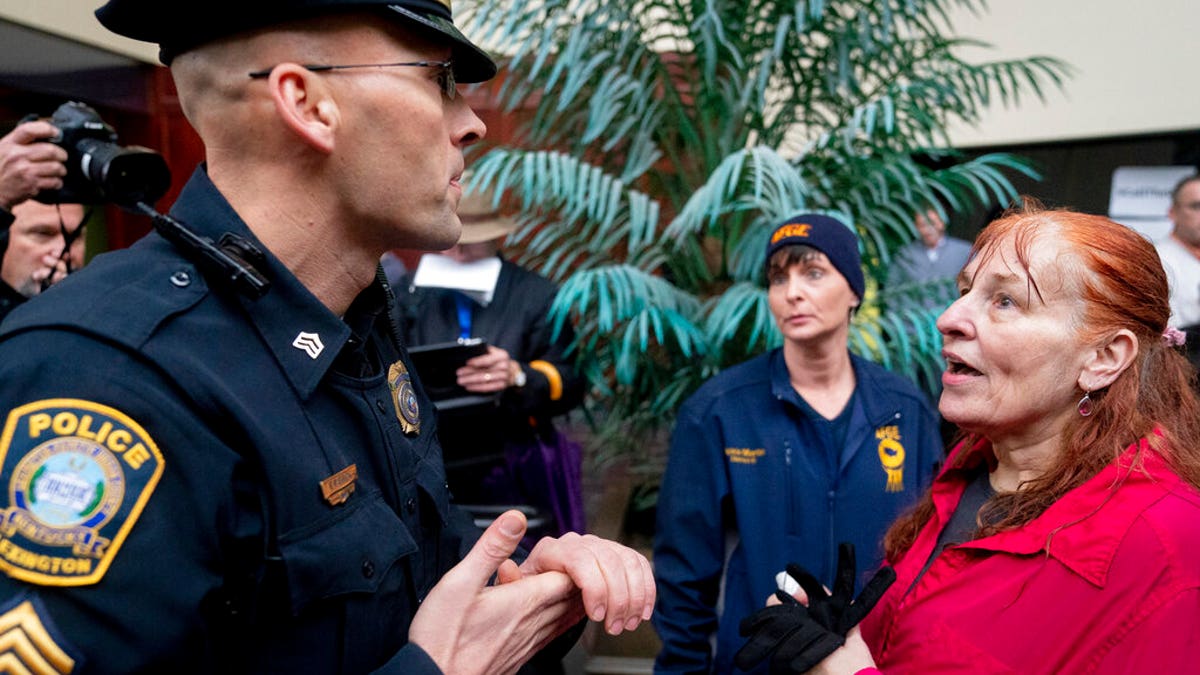
Reese Greer, right, a furloughed census worker, argues with a Lexington police officer outside U.S. Sen. Mitch McConnell's office in Lexington, Ky., Wednesday, Jan 23, 2019, during a government shutdown protest. (AP Photo/Bryan Woolston)
The partial shutdown began just before Christmas after Trump indicated that he wouldn't sign a stopgap spending bill backed by top Republicans like McConnell, who shepherded a bill through the Senate that would have funded the government up to Feb. 8. The House passed a plan with money for the wall as one of the last gasps of the eight-year GOP majority.
On Thursday, almost five weeks later, House Democrats continued work on a package that would ignore Trump's demand for $5.7 billion for a wall with Mexico and would instead pay for other ideas aimed at protecting the border.
A poll by The Associated Press-NORC Center for Public Affairs Research was the latest indicator that the shutdown is hurting Trump with the general public. While his approval among Republicans remains strong, just 34 percent of Americans like his performance as president and 6 in 10 assign a great deal of responsibility to him for the shutdown, about double the share blaming Democrats, according to the poll out Wednesday.
Fox News' Chad Pergram, Samuel Chamberlain, John Roberts, Jared Halpern, Jason Donner, and The Associated Press contributed to this report.







































